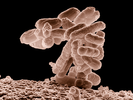 In 2013 a small open label, randomised, controlled trial in the NEJM hit the headlines: Nood et al. were able to show that the enteral infusion of donor feces is a potential therapeutic strategy against recurrent C. difficile infections. This was important news as the efficacy of antibiotic therapy decreases with subsequent recurrences. The study suggested that the enteral infusion of donor feces, as compared with vancomycin therapy, results in much better treatment outcomes. But as we all know, every treatment has its side effects. Nood et al. described diarrhoea, cramping and belching as observed adverse events, but all of this resolved quite quickly... Alang et al. have now published a brief report of a woman with recurrent C. difficile infections despite treatments with Metronidazol and Vancomycin. Despite all efforts diarrhoea re-occured again and she finally underwent fecal microbiota transplantation. After the application of donor stool form her daughter through the colonoscope her symptoms resolved and no further C. difficile infection occurred. 16 months later the patient presented again with an unintentional weight gain of about 15kg. The authors mention that several factor might have contributed to her weight gain (e.g. concurrent treatment of existing H. pylori). In regards of the fact that the patient had never been obese before and the donor also experienced a significant weight gain raises the possibility that the fecal transplantation might have at least partially caused her obesity. And important to know: Animal models have shown, that an obese microbiota can be transmitted. Looks like Newport Hospital in Rhode Island took the appropriate action: their policy now is to use non-obese donors only. Along et al. Open Forum Infectious Diseases, Nov 2014 OPEN ACCESS Nood et al. N Engl J Med 2013;368:407-15. OPEN ACCESS |
Search
|


 RSS Feed
RSS Feed


